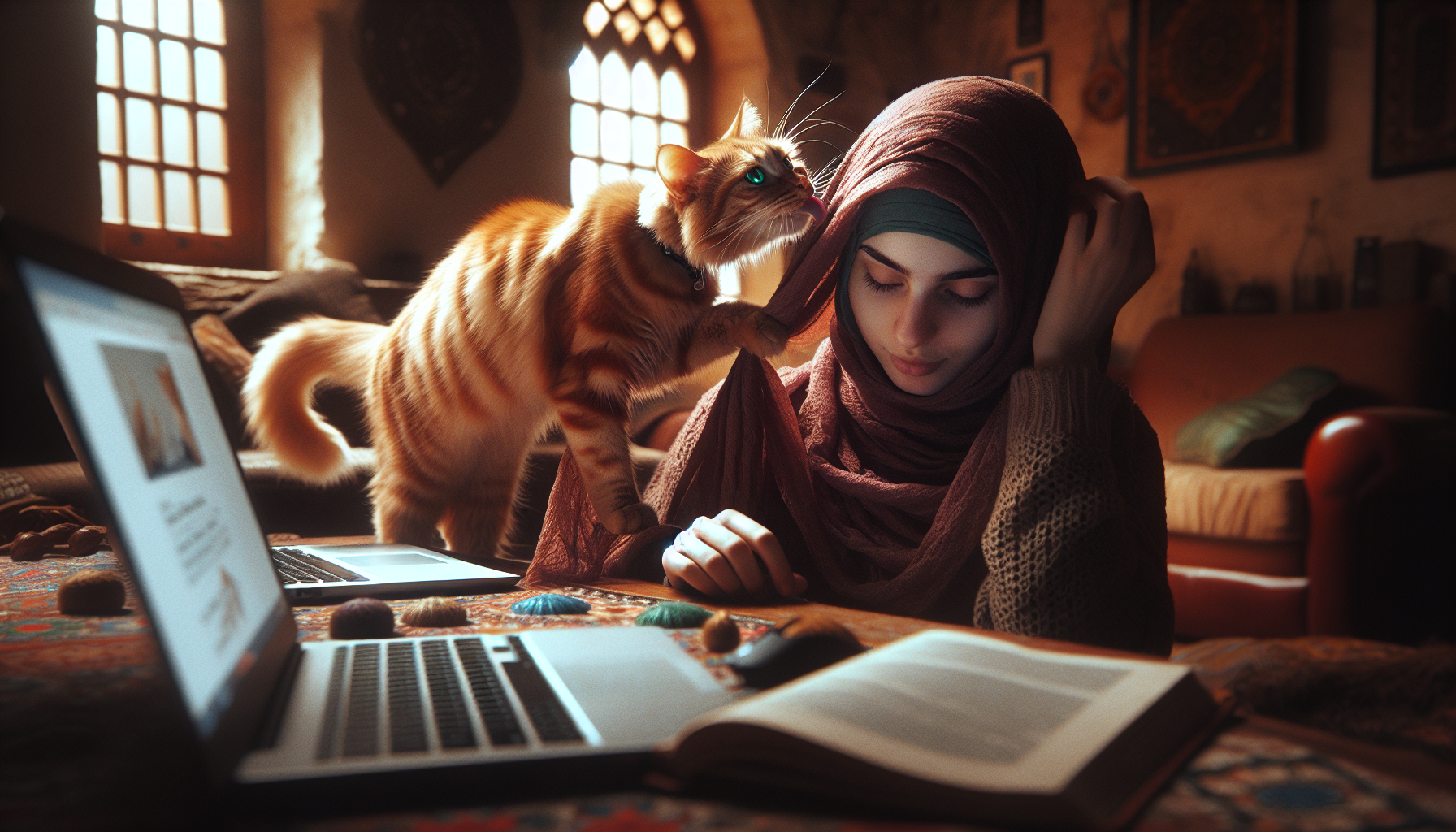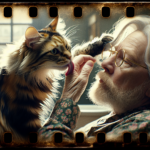Contents
The behavior of cats licking human hair
Why do cats lick human hair?
Cats are known for their grooming habits, which include licking themselves and their owners. While it may seem strange to have your cat give your hair a cleaning session, there are actually a few reasons why they engage in this behavior.
One possible reason is that cats consider their owners as part of their family, and grooming is a way for them to show affection. Licking your hair is their way of bonding and showing that they trust and love you.
Another reason is that cats are attracted to the smell and taste of human hair. Your hair holds scents from different environments, such as outdoor smells or the scent of other animals. Cats have a highly developed sense of smell, and they find these scents intriguing.
Should you allow your cat to lick your hair?
While it may be tempting to let your cat groom your hair, there are a few considerations to keep in mind.
Firstly, cat saliva contains certain bacteria that may not be harmful to cats but could potentially be harmful to humans. Allowing your cat to lick your hair increases the risk of transferring these bacteria to your scalp, which can lead to irritation or infection. It is important to maintain good hygiene and take appropriate precautions.
Additionally, some cats may become too focused on grooming and start to nibble or chew on your hair, which can lead to hair breakage or ingestion. If you notice this behavior, it may be better to redirect your cat’s attention to other activities or provide them with appropriate toys for grooming.
How to discourage your cat from licking your hair
If you want to discourage your cat from licking your hair, there are a few steps you can take:
1. Redirect their attention: Offer them a toy or engage them in interactive play to redirect their focus from your hair to a more appropriate object.
2. Provide alternative grooming opportunities: Make sure your cat has access to a scratching post or grooming brush to satisfy their grooming needs.
3. Set boundaries: Gently remove your cat from your hair when they start licking, and redirect their attention to a different activity. Consistency is key in teaching them that licking your hair is not acceptable behavior.
4. Create a positive association: Reward your cat with treats or praise when they engage in appropriate grooming behavior, such as grooming themselves or using a grooming brush.
Cats licking human hair can be attributed to their affectionate nature and their attraction to the scents and tastes of our hair. While it can be seen as a sign of love and trust, it is important to maintain good hygiene and prevent any potential health risks. By providing alternative grooming opportunities and setting boundaries, you can discourage your cat from licking your hair while still maintaining a loving bond.
Possible explanations and meanings behind hair licking
Have you ever noticed a cat or dog enthusiastically licking their own or someone else’s hair? You may have found it strange or wondered why they engage in this behavior. In this article, we will explore some possible explanations and meanings behind hair licking in animals.
1. Grooming and Hygiene
One of the primary reasons animals lick their hair is for grooming purposes. Licking helps to clean their fur, removing dirt, debris, and excess oil. This self-grooming behavior is especially common in cats and is essential for them to maintain a healthy coat. Additionally, animals may also lick the hair of their fellow companions as a way of helping with their grooming routine.
2. Social Interaction and Bonding
Hair licking can also serve as a form of social interaction and bonding between animals. Just like humans engage in physical touch as a way to show affection, animals use licking as a means of communication. When one animal licks another’s hair, it can be a sign of trust, friendship, or submission. This behavior helps strengthen the social bonds within a group or between domestic pets and their owners.
3. Sensory Exploration
Another possible explanation for hair licking is sensory exploration. Animals use their tongues to gather information about their environment. By licking their own or someone else’s hair, they can detect scents, taste different substances, or even identify potential threats. It’s a way for them to gather information and understand the world around them.
4. Stress Relief
Licking hair can also be a self-soothing behavior for animals in stressful situations. It provides comfort and helps them relax in high-pressure situations. This behavior is particularly common in animals that have experienced trauma or anxiety. If you notice excessive hair licking accompanied by other signs of distress, it may be a good idea to consult a veterinarian to address the underlying cause.
While hair licking in animals may seem peculiar to us, it serves various purposes depending on the context. From grooming and hygiene to social interaction and stress relief, hair licking plays a role in their daily lives. It’s essential to understand these possible explanations and meanings behind the behavior to better understand our furry friends and provide them with the care they need.
How to respond to your cat’s hair licking behavior
Understanding Your Cat’s Hair Licking Behavior
As a cat owner, you may have observed your furry friend engaging in the behavior of licking their own fur excessively. While grooming is a natural and necessary activity for cats, excessive hair licking can signal an underlying issue. It’s important to understand why your cat is indulging in this behavior to provide appropriate and timely response.
1. Rule Out Medical Issues
If your cat suddenly starts licking their hair excessively, it’s crucial to rule out any potential medical issues. Visit your veterinarian to ensure there are no health problems like allergies, skin infections, parasites, or pain that may be causing discomfort to your cat. Identifying and treating health issues can help in reducing or eliminating the hair licking behavior.
2. Maintain a Nutritious Diet
Providing a balanced and nutritious diet plays a vital role in your cat’s overall health. Make sure your feline friend is receiving a high-quality cat food that meets their specific dietary needs. Depriving your cat of essential nutrients may lead to skin dryness or irritation, triggering excessive licking. Consult with your veterinarian to determine the best diet for your cat’s specific needs.
3. Ensure Proper Hydration
Hydration is crucial for maintaining healthy skin and coat. Ensure your cat always has access to fresh water and consider incorporating wet food into their diet to increase their overall moisture intake. Dry skin can cause itching and discomfort, which may lead to excessive hair licking. Keeping your cat properly hydrated can help alleviate this issue.
4. Provide Mental and Physical Stimulation
Boredom and stress can contribute to excessive grooming behavior. Provide your cat with plenty of mental and physical stimulation to prevent boredom. Engage in interactive play sessions, offer stimulating toys, and create a cat-friendly environment with scratching posts and perches. A stimulated and happy cat is less likely to resort to excessive hair licking.
5. Regular Grooming Sessions
Helping your cat maintain a clean and healthy coat through regular grooming can reduce the need for excessive licking. Brush your cat’s fur regularly to remove loose hairs and prevent matting. Not only does this help control hair ingestion, but it also strengthens the bond between you and your cat.
6. Consider Environmental Changes
If your cat’s hair licking behavior persists despite addressing any potential medical issues and providing adequate care, consider any recent changes in their environment. Cats can be sensitive to changes in their surroundings, such as a new addition to the household, a change in routine, or the introduction of a new pet. Identifying and addressing any stressors can help alleviate the hair licking behavior.
Understanding and responding appropriately to your cat’s hair licking behavior is essential for their overall well-being. By ruling out medical issues, providing a balanced diet and proper hydration, offering mental and physical stimulation, practicing regular grooming sessions, and addressing any environmental changes, you can help reduce or eliminate excessive hair licking. Remember, maintaining a happy and healthy cat requires your attention, care, and understanding.





